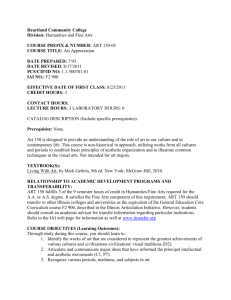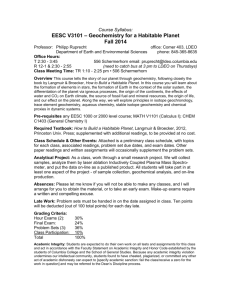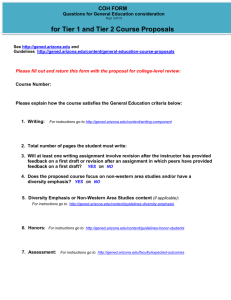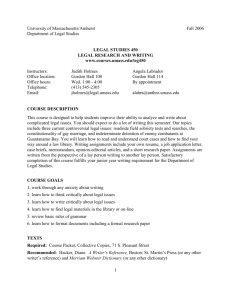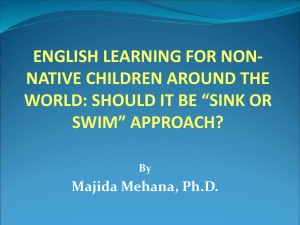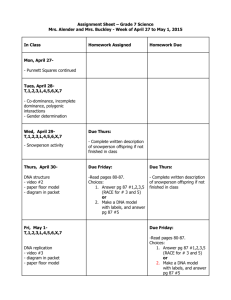Sp-0826-Bilingual-Communities-Doyle - GenEd
advertisement
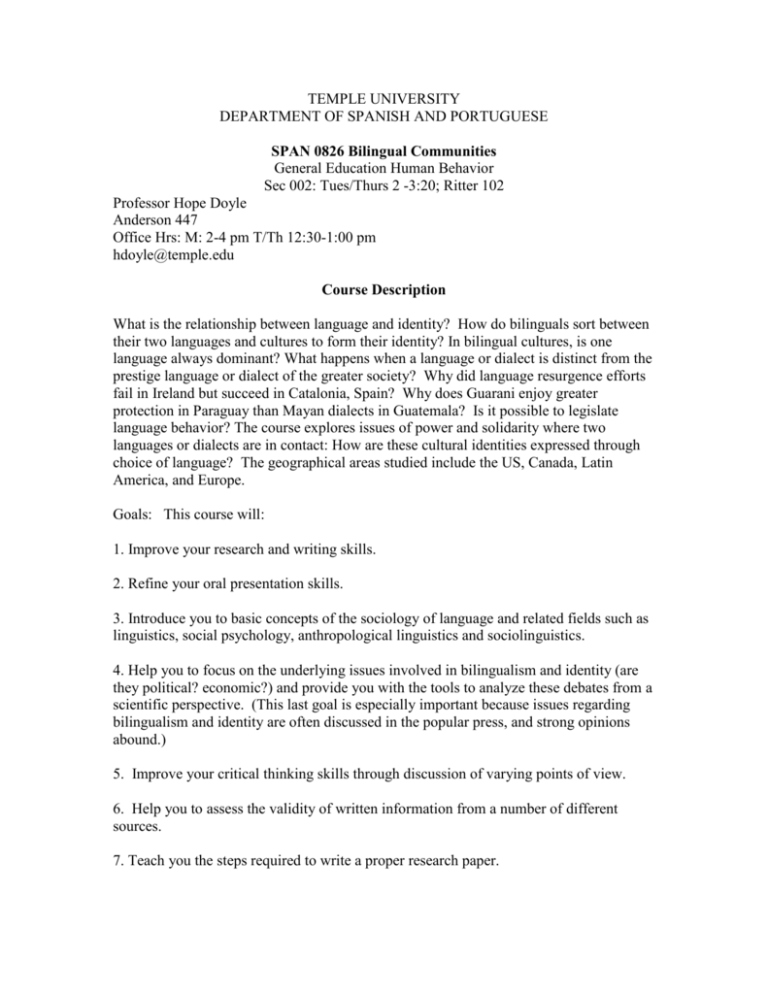
TEMPLE UNIVERSITY DEPARTMENT OF SPANISH AND PORTUGUESE SPAN 0826 Bilingual Communities General Education Human Behavior Sec 002: Tues/Thurs 2 -3:20; Ritter 102 Professor Hope Doyle Anderson 447 Office Hrs: M: 2-4 pm T/Th 12:30-1:00 pm hdoyle@temple.edu Course Description What is the relationship between language and identity? How do bilinguals sort between their two languages and cultures to form their identity? In bilingual cultures, is one language always dominant? What happens when a language or dialect is distinct from the prestige language or dialect of the greater society? Why did language resurgence efforts fail in Ireland but succeed in Catalonia, Spain? Why does Guarani enjoy greater protection in Paraguay than Mayan dialects in Guatemala? Is it possible to legislate language behavior? The course explores issues of power and solidarity where two languages or dialects are in contact: How are these cultural identities expressed through choice of language? The geographical areas studied include the US, Canada, Latin America, and Europe. Goals: This course will: 1. Improve your research and writing skills. 2. Refine your oral presentation skills. 3. Introduce you to basic concepts of the sociology of language and related fields such as linguistics, social psychology, anthropological linguistics and sociolinguistics. 4. Help you to focus on the underlying issues involved in bilingualism and identity (are they political? economic?) and provide you with the tools to analyze these debates from a scientific perspective. (This last goal is especially important because issues regarding bilingualism and identity are often discussed in the popular press, and strong opinions abound.) 5. Improve your critical thinking skills through discussion of varying points of view. 6. Help you to assess the validity of written information from a number of different sources. 7. Teach you the steps required to write a proper research paper. Required Readings: These may be found on our Blackboard Course site. Selections from: Weber, Jean-Jacques and Horner, Kristine. Introducing Multilingualism; A social approach. Routledge, NY. 2012 Selections from: Handbook of Language and Ethnic Identity Disciplinary and Regional Perspectives (Volume 1) 2nd Edition Edited by Joshua A. Fishman and Ofelia Garcia, 2010 Oxford UP: “The United States” Terrence G. Wley “Germany,” James Dow “African American Language” by Sonja L. Lanehart. “Sign Language and the Deaf Community” by Colin Baker “Lingua Franca” by Luis Calvet in Language Wars. “Latin America” by García, Lopez and Makar. Selections from Language and Nationalism in Europe. Eds. Barbour and Carmichael. 2007: “The Iberian Peninsula: Conflicting Linguistic Nationalisms.”. “Language and Nationalism in Italy: Language as a Weak Marker of Identity” by Carlo Ruzza. “Attitudes toward Bilingualism among Youths in Barcelona” by Hope Doyle (1995) Catalan Review “Trench Warfare: The Case of French.” In Language Wars, by Luis Calvet General Education Program Goals GenEd is about making connections. GenEd classes draw connections between academic knowledge and current controversies. From global terrorism to global climate change, from digital mapping to the future of television, GenEd classes will involve looking at cutting edge issues from multiple perspectives. GenEd draws connections too with the city of Philadelphia, as classroom study is integrated with Temple’s dynamic urban environment. GenEd facilitates linkages by stressing the development of eight skills and abilities rather than on content knowledge. The Program in General Education provides opportunities for students to engage in: Critical Thinking Think critically Within GenEd, students who think critically recognize an object of investigation, frame questions about it, and interrogate assumptions—explicit or implicit. Critical thinking includes the evaluation of evidence, analysis and synthesis of multiple sources, and reflection on varied perspectives. Critical thinking generates a well-developed investigation that incorporates supporting and countering claims. A student engaged in critical thinking produces an informed account, a hypothesis for further study, or the solution to a problem. Contextualized Learning Understand historical and contemporary issues in context Within GenEd, students who contextualize learning understand and integrate historical, SYLLABUS SPAN 0826 BILINGUAL COMMUNITIES FALL 2013 2 contemporary, and cultural phenomena and their underlying principles in two broad applications. First, contextual learners recognize the interaction of complex forces that give rise to specific phenomena. Second, contextual learners understand and analyze related events, artifacts, practices and concepts across geographic, chronological and cultural boundaries. Interdisciplinary Thinking Understand and apply knowledge in and across disciplines Within GenEd, students who use interdisciplinary thinking recognize the world presents problems, topics, or issues too complex to be satisfactorily addressed though a single lens. Thus, interdisciplinary thinkers apply multiple perspectives, paradigms, and frameworks to problems, topics, or issue Communication Skills Communicate effectively orally and in writing Within GenEd, students who communicate effectively use spoken and written language to construct a message that demonstrates the communicator has established clear goals and has considered her or his audience. Effective messages are organized and presented in a style appropriate to the context. Scientific & Quantitative Reasoning Within GenEd, students who exercise quantitative and scientific reasoning use and apply these reasoning processes to explain phenomena in the context of everyday life. Quantitative reasoning includes statistical and/or logical problem-solving, the relationships between quantities, and the use and misuse of quantitative data. Scientific reasoning introduces students to the evolution and interdependence of science and technology and includes problem identification, hypothesis evaluation, experimentation, interpretation of results and the use and misuse of scientific data. Civic Engagement Function as an engaged citizen in a diverse and globalized world Within GenEd, students open to civic engagement view themselves as connected to local and global communities where they participate in activities that address issues of public concern. Critically engaged students define issues, pose, probe, and solve problems with an awareness of and an inclusion of the diverse values and interests. Information Literacy Identify, access and evaluate sources of information Within GenEd, information literacy encompasses a broad spectrum of abilities, including the ability to recognize and articulate information needs; to locate, critically evaluate, and organize information for a specific purpose; and to recognize and reflect on the ethical use of information. Lifelong Learning Promote a lasting curiosity GenEd cultivates these skills and abilities throughout the required undergraduate curriculum, and students will experience these ways of being though readings, discussions, activities, and classes throughout GenEd. Additional Policies: Policy on absences: Students are expected to be present in class and participate in class discussions based on the assigned readings and other assignments. If a student is absent due to illness, the SYLLABUS SPAN 0826 BILINGUAL COMMUNITIES FALL 2013 3 student must contact the instructor via email before return to class. Upon return to class, the student must produce a note from a doctor for the absence to be excused. Three (3) unexcused absences will result in an ‘F’ for participation. Work required: * Students are expected to attend class regularly and participate in class discussions, which will occur daily. * Students must submit all answers to reading questions where appropriate, in typewritten form. Responses are due on the date that the article is listed on the syllabus. These questions are intended to help students determine the most important information in the readings, begin to think about broader issues related to them, and to aid students in their preparation for class discussions. * Students will work in pairs to give a brief presentation on state promotion of a minority language. (Week 6) * There will be three hourly exams on material from readings, class discussions, and student presentations. (Weeks 5, 9 and 13) * Submit an outline (Week 9) and a bibliography (Week 10) of their final paper regarding circumstances of bilingualism in a region of their choice. * Present findings of Web Searching and Evaluation Project (Week 10) Students will submit an outline (Week 9) and a bibliography (Week 10) of their final paper regarding circumstances of bilingualism in a region of their choice. Students will submit a draft of their final research paper (Week 12) * Students must give an individual final presentation on their final paper (Week 14) * Submit a final paper (Exam Week). Students who fail to submit a final paper will not pass the course. * NO LATE WORK WILL BE ACCEPTED AFTER THE SUBMISSION DATE PLEASE NOTE: NO TEXTING OF ANY KIND WILL BE TOLERATED. STUDENTS FOUND TEXTING WILL BE MARKED ABSENT FROM THE CLASS. SYLLABUS SPAN 0826 BILINGUAL COMMUNITIES FALL 2013 4 Grading criteria: 2 Exams: Class presentations: 3 oral presentations: One in pairs, two solo presentation on the Web Searching and Evaluation Project, and one on the final paper: Timely submission of draft/ bibliography/ outline of final paper Participation Typed responses to orientation questions for the readings. (Helps students to participate in class discussions): Final Paper (6-8 pgs) 30% 15% 15% 10% 20% 10% Bilingual Communities Program: ______________________WEEK 1_________________________ Tues. August 27: Introduction Thurs. Aug 29: The Construction of Meaning/ Language Ideologies Standard vs. ‘Non-standard’ languages Before Class Read: Weber and Horner (Chapter 2: Theoretical Framework pgs: 12-24) And: Weber and Horner (What is a language, pgs: 25-38) ________________________ WEEK 2___________________________ Tues September 3: Spread of Global languages Endangered Languages Before Class Read: Weber and Horner (Language Variation and Spread, pgs: 3952) And Weber and Horner (Revitalization of endangered languages, pgs 53-67) Thurs Sept 5: Societal and Individual Multilingualism Ethnic and National Identity SYLLABUS SPAN 0826 BILINGUAL COMMUNITIES FALL 2013 5 Before Class Read: Weber and Horner (Societal mulitilingualism, pgs. 67-81) And Weber and Horner (Language and Identities, pgs 82-95) ________________________ WEEK 3 ___________________________ Tues Sept 10 Library Research Lecture (?) Individual vs. Social Identity: Canada Before Class Read: Weber and Horner (The Interplay between individual and societal multilingualism, pgs. 96- 104) Thurs, Sept 12 Bilingualism in the United States Read: “The United States” Terrence G. Wiley ________________________ WEEK 4___________________________ Tues. Sept 17 Bilingualism in the US Read “African American Language” by Sonja L. Lanehart Thurs. Sept 19 Read: “Language Contact Phenomena in Luisiana Isleño Spanish” by John Lipski: http://www.personal.psu.edu/jml34/isleno.pdf ________________________ WEEK 5___________________________ Tues., Sept 24 In-class web evaluation activity. Thurs., Sept 26 Read.“Sign Language and the Deaf Community” by Colin Baker ________________________ WEEK 6 ___________________________ Tues., October 1 Presentation I (in pairs) Endangered languages. SYLLABUS SPAN 0826 BILINGUAL COMMUNITIES FALL 2013 6 Thurs., Oct 3 Presentation I (cont.) Review for Exam I ________________________ WEEK 7___________________________ Tues., Oct 8 Exam I Thurs., Oct 10 Linguistic identity Read: “Latin America” by García, Lopez and Makar. Submit idea for final paper ________________________ WEEK 8___________________________ Tues., Oct 15 Bilingualism in the Europe – ethnic and linguistic varieties and geography Read: “The Iberian Peninsula: Conflicting Linguistic Nationalisms.” In Language and Nationalism in Europe. Eds. Barbour and Carmichael. 2007. Thurs., Oct 17: Read: “Attitudes toward Bilingualism among Youths in Barcelona” by Hope Doyle (1995) Catalan Review ________________________ WEEK 9___________________________ Tues, Oct 22 Read: “Language and Nationalism in Italy: Language as a Weak Marker of Identity” by Carlo Ruzza. In Language and Nationalism in Europe. Eds. Barbour and Carmichael. 2007. Submit Outline for final paper Thurs., Oct 24 TBA ________________________ WEEK 10___________________________ Tues., Oct 29 SYLLABUS SPAN 0826 BILINGUAL COMMUNITIES FALL 2013 7 Read: “Lingua Franca” in Language Wars. Calvet Thurs., Oct 30 Presentation on Web Searching and Evaluation Project Submit Bibliography for final paper and presentation ________________________ WEEK 11___________________________ Tues., November 5 Read: Ireland (TBA) Thurs., Nov 7 Language, colonization and identity Read: “Trench Warfare: The Case of French” By Luis Calvet. In Language Wars. Submit polished draft of final paper ________________________ WEEK 12 ___________________________ Tues. Nov. 12 Read: “Germany” by Dow Thurs. Nov 14 Read: South Africa ________________________ WEEK 13___________________________ Tues. Nov 19 TBA Thurs. Nov 21 Final presentations on bilingualism and issues of identity in a region of student’s choice ________________________ WEEK 14___________________________ SYLLABUS SPAN 0826 BILINGUAL COMMUNITIES FALL 2013 8 Tues. Nov 26 Final presentations continued. Review for Exam II Thurs. Nov 28 THANKSGIVING ________________________ WEEK 15___________________________ Tues. December 3 Exam II Submit final paper to Blackboard by Tuesday December 10. SYLLABUS SPAN 0826 BILINGUAL COMMUNITIES FALL 2013 9


